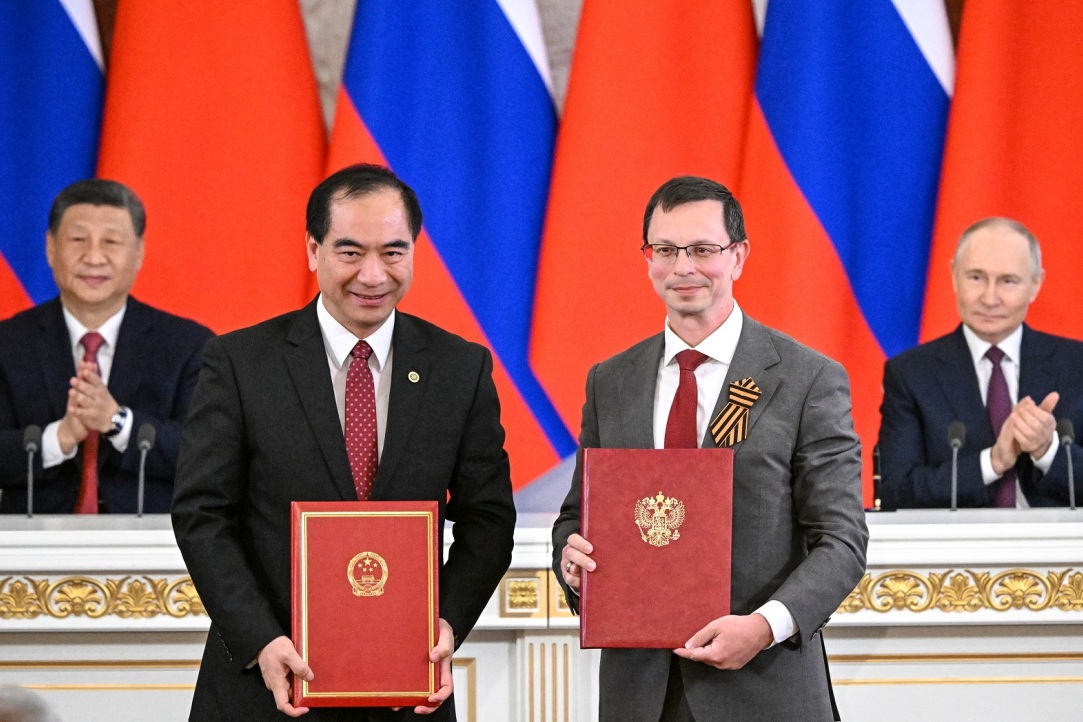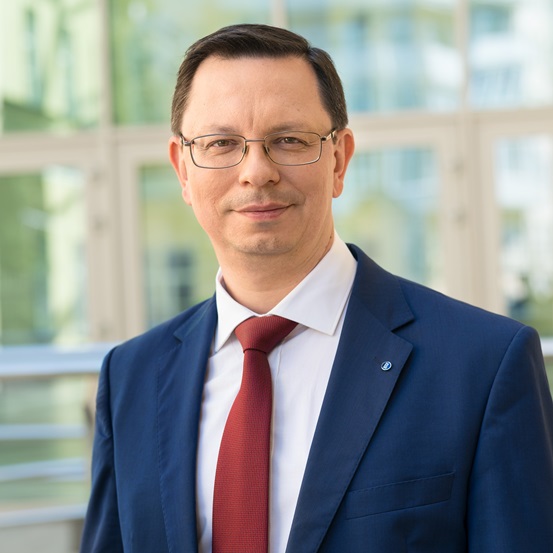HSE University Signs Cooperation Agreements with Leading Chinese Universities

On May 8, 2025, in Moscow, in the presence of Russian President Vladimir Putin and Chinese President Xi Jinping, strategic agreements were signed between HSE University and two of China's top institutions, Peking University and Tsinghua University. The event was attended by Nikita Anisimov, Rector of HSE University, Qiu Yong, Secretary of the CPC Tsinghua University Committee, and Gong Qihuang, President of Peking University. The signing unfolded during the official visit of the Chinese delegation to Russia, coinciding with the commemoration of the 80th anniversary of Victory Day.
These agreements mark a significant stride in advancing the strategic partnership between Russia and China, aimed at cultivating a unified academic space and reinforcing the BRICS institutional framework. By emphasising fundamental disciplines, both nations express a commitment to advancing research that paves the way for future technological breakthroughs.
The agreement between HSE University and Peking University focuses on enhancing scientific collaboration in natural sciences, including physics, chemistry, and advanced materials. The universities have embarked on a joint research initiative titled 'Engineering of Highly Efficient and Stable Perovskite Solar Cells.' This project became one of the winners of the HSE University competition 'International Academic Cooperation.' In this initiative, HSE University is represented by the Quantum Nanoelectronics Laboratory of the HSE Tikhonov Moscow Institute of Electronics and Mathematics.
Additionally, HSE University and Peking University will sign an agreement to establish a BRICS research platform. This collaborative academic space will enable Russian and Chinese researchers to delve into crucial areas of scientific enquiry, examine the operations of multilateral institutions, explore global governance processes, and analyse interactions between Russia and China in the field of international relations.
The cooperation agreement between HSE University and Tsinghua University is aimed at cultivating academic, cultural, and educational ties. This partnership will lay the groundwork for collaborative programmes, including research endeavours and student exchanges.
Today, HSE University stands as one of Russia's top universities focused on fostering a comprehensive partnership between Russia and China. The institution collaborates with over 40 leading educational and research organisations in China. HSE University offers a diverse range of bachelor's, master's, and professional retraining programmes centred on Chinese studies and engagement with China. Approximately 1,300 HSE students are currently learning Chinese, while more than 300 students from China are enrolled at HSE University, many through exchange programmes.
Looking ahead, HSE University aims to broaden its cooperation formats and introduce new initiatives with Chinese universities and research centres, emphasising the advancement of fundamental sciences and the enhancement of international scientific dialogue.

Nikita Anisimov, Rector of HSE University
'HSE University and Chinese universities are already connected through successful joint efforts. Recently, during our delegation's visit to China, our universities reached an agreement to further expand this partnership. We are confident that our new agreements with Peking University and Tsinghua University will not only strengthen bilateral ties and enrich cutting-edge scientific research but also propel the cooperation between Russia and China to new heights. Notably, our scientific collaboration with Chinese partners now includes a BRICS dimension: the member states play a crucial role in shaping a new multipolar global architecture, which necessitates comprehensive and profound expert examination of their interactions and influence on the international landscape.'
See also:
‘It Was Interesting to See How Our Chinese Colleagues Work’: HSE Researchers Take Part in Hefei Summer School
This summer, Diana Sukhoverkhova, Daria Mazur, and David Kagramanyan, research assistants at the MIEM HSE Laboratory for Computational Physics, spent five weeks in China. At the Future Scientist Exchange Program (FuSEP) summer school in Hefei, they worked in new fields of science together with their Chinese colleagues. HSE's promising scientists spoke to the HSE News Service about their intense and productive time in China.
Intellectual Capital in the Face of Shocks: Russia and Iran Explore Internationalisation
In today's issue of Schola, Mariya Molodchik, Senior Research Fellow at the International Laboratory of Intangible-Driven Economy and Professor at the School of Economics and Finance at HSE University’s Campus in Perm, discusses a joint project with Iran University of Science and Technology, titled 'Internationalization of Companies from Developing Countries: The Role of Intellectual Resources in Response to Exogenous Shocks.'
HSE Researchers Introduce Novel Symmetry-Aware Neural Network Architecture
Researchers at the HSE Laboratory for Geometric Algebra and Applications have developed a new neural network architecture that can accelerate and streamline data analysis in physics, biology, and engineering. The scientists presented their solution on July 16 in Vancouver at ICML 2025, one of the world's leading conferences on machine learning. Both the paper and the source code are publicly available.
Works of HSE Art and Design Students Presented at Pingyao International Photography Festival
On September 19, the 25th Pingyao International Photography Festival (PIP) opened in Pingyao, Shanxi Province, China. The exhibition features the works of 16 students of the Faculty of Creative Industries at the HSE Art and Design School, selected following the results of the HSE Creative Open / Photoproject international competition, which received more than 300 entries.
Students from HSE and Other Universities Carry Out Research Expedition at New Chersonesos
As part of the Rediscovering Russia student expedition programme, HSE University organised a research trip under the framework of the School for Young Humanities Scholars to the New Chersonesos museum and church complex in Sevastopol. The results of this expedition will form the basis for proposals on educational projects aimed at shaping young people’s historical memory of the role of Chersonesos, Crimea, and the Byzantine legacy in the history of Russian culture and statehood.
HSE Researchers Determine Frequency of Genetic Mutations in People with Pulmonary Hypertension
For the first time in Russia, a team of scientists and clinicians has conducted a large-scale genetic study of patients with pulmonary arterial hypertension. The team, which included researchers from the International Laboratory of Bioinformatics at the HSE Faculty of Computer Science, analysed the genomes of over a hundred patients and found that approximately one in ten carried pathogenic mutations in the BMPR2 gene, which is responsible for vascular growth. Three of these mutations were described for the first time. The study has been published in Respiratory Research.
First Caucasus School on Experimental Research and Cognitive Sciences Takes Places in Adygea
On September 17–20, 2025, the First Caucasus School on Experimental Research and Cognitive Sciences took place at the Gornaya Legenda venue of Adyghe State University (ASU). The event was organised by the ASU Experimental Linguistics Laboratory, the HSE Centre for Language and Brain, and the HSE Centre for Sociocultural and Ethnolinguistic Studies. The school brought together over 50 participants—students, doctoral candidates, and early-career researchers from across Russia, along with lecturers and speakers from France, Serbia, China, Turkey, Kazakhstan, and Uzbekistan.
HSE Scientists Reveal How Disrupted Brain Connectivity Affects Cognitive and Social Behaviour in Children with Autism
An international team of scientists, including researchers from the HSE Centre for Language and Brain, has for the first time studied the connectivity between the brain's sensorimotor and cognitive control networks in children with autism. Using fMRI data, the researchers found that connections within the cognitive control network (responsible for attention and inhibitory control) are weakened, while connections between this network and the sensorimotor network (responsible for movement and sensory processing) are, by contrast, excessively strong. These features manifest as difficulties in social interaction and behavioural regulation in children. The study has been published in Brain Imaging and Behavior.
‘The Future Is Not Predetermined—We Shape It with the Decisions We Make Today’
The strategic technological project ‘National Centre of Science, Technology, and Socio-Economic Foresight’ at HSE University spans horizons of 10 to 30 years and involves developing new methodologies of scenario analysis. It brings together researchers from different fields and helps to form a holistic vision of the future. The aim of the project is not only to produce forecasts but also to generate practical recommendations for government and business. Anastasia Likhacheva, Dean of the HSE Faculty of World Economy and International Affairs, explains why it is important to learn to ask the right questions about the future.
Scientists Discover How Correlated Disorder Boosts Superconductivity
Superconductivity is a unique state of matter in which electric current flows without any energy loss. In materials with defects, it typically emerges at very low temperatures and develops in several stages. An international team of scientists, including physicists from HSE MIEM, has demonstrated that when defects within a material are arranged in a specific pattern rather than randomly, superconductivity can occur at a higher temperature and extend throughout the entire material. This discovery could help develop superconductors that operate without the need for extreme cooling. The study has been published in Physical Review B.


